|
|
|
Sort Order |
|
|
|
Items / Page
|
|
|
|
|
|
|
| Srl | Item |
| 1 |
ID:
110208
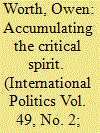

|
|
|
|
|
| Publication |
2012.
|
| Summary/Abstract |
This article introduces Rosa Luxemburg's work on dialectics and the international and argues that its ontological foundations have been neglected within critical International Political Economy (IPE). Whereas other critical Marxists such as Gramsci have played key roles in instigating critical enquiry, Luxemburg's work has largely gone neglected. Although this article acknowledges some serious shortcomings in some of the 'left infantilism' inherent within her work, it nevertheless argues that Luxemburg's dialectical ontology significantly contrasted with the orthodoxy that was emerging from Marxist circles at the time. This article explores some of these and argues that the dialectical method that Luxemburg employed to understanding the international provides us with a new avenue for critical IPE to pursue. In particular, it suggests that Luxemburg's articulation of critique provides us with fresh openings that both compliment and add to neo-Gramscian and neo-Polanyian accounts, and allows us to understand trends and practices within the global political economy in new critical ways.
|
|
|
|
|
|
|
|
|
|
|
|
|
|
|
|
| 2 |
ID:
069088
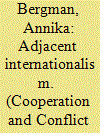

|
|
|
| 3 |
ID:
155790
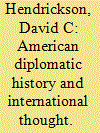

|
|
|
|
|
| Summary/Abstract |
This essay offers a constitutional perspective on the American encounter with the problem of international order. Its point of departure is the American Founding, a subject often invisible in both the history of international thought and contemporary International Relations theory. Although usually considered as an incident within the domestic politics of the United States, the Founding displays many key ideas that have subsequently played a vital role in both international political thought and IR theory. The purpose of this essay is to explore these ideas and to take account of their passage through time, up to and including the present day. Those ideas shine a light not only on how we organize our scholarly enterprises but also on the contemporary direction of US foreign policy and the larger question of world order.
|
|
|
|
|
|
|
|
|
|
|
|
|
|
|
|
| 4 |
ID:
185796
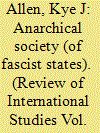

|
|
|
|
|
| Summary/Abstract |
While scholars within the English School have increasingly approached the traditionally liberal concept of solidarism in a normatively agnostic fashion, the idea of an ‘illiberal solidarism’ and historical manifestations thereof remain underexplored. One notable case in point surrounds the peculiar body of Italian interwar international thought, herein referred to as ‘international Fascism’. By discerning a synchronic outline of international Fascism, alongside the manner by which this project mutated and ultimately failed as it transformed from a vision theorised in the abstract to a practical initiative under the auspices of the Fascist regime, this article offers historical and theoretical insights into the realisability of illiberal forms of solidarism. Combining this historical account with theoretical insights derived from Reus-Smit's study on international order under conditions of cultural diversity, this article argues that the realisation of some form of solidarism necessitates the acceptance of a substantive pluralist component. Yet messianic illiberal visions that endeavour to retain the states-system, while simultaneously asserting the superiority of one community or a highly exclusionary vision of the ‘good life’, ostensibly lack the capacity to reconcile the contradictions inherent in efforts to universalise such projects.
|
|
|
|
|
|
|
|
|
|
|
|
|
|
|
|
| 5 |
ID:
113252
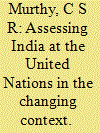

|
|
|
|
|
| Publication |
2010.
|
| Summary/Abstract |
The United Nations (UN) has been a useful instrument for India not only in pursuing its foreign policy goals effectively, but also for the progressive and peaceful transformation of the global political system. The changing priorities of the country's political leadership, the challenge of reconciling subjective interests with objective principles, the nuanced pursuit of non-alignment and sensitivity to the existing international system have historically worked as factors to create a mix of effects in India's performance in the world body. In the intricate agenda of the new century, India's participation highlights concerns on reinforcing the core strengths of the UN in managing non-traditional security threats, including transnational terrorism, mobilizing collective action in the era of globalization for minimizing the economic inequities, both within and between countries, and lastly revitalization of the UN structures including, in particular, the Security Council's composition through comprehensive reforms by common agreement. As for future strategy, the hope of replaying its past leadership role may be a less appropriate and acceptable option than building pragmatic and issue-based partnerships with all relevant countries in multilateral negotiation settings.
|
|
|
|
|
|
|
|
|
|
|
|
|
|
|
|
| 6 |
ID:
164043
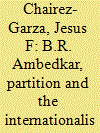

|
|
|
|
|
| Summary/Abstract |
This article analyses the way in which B.R. Ambedkar attempted to internationalise the problem of untouchability in the years prior to Partition. The move towards the international was an attempt to secure a political space for Dalits as a consequence of the Muslim League’s demand for Pakistan. Unable to reach an agreement with the likes of Gandhi and Jinnah, Ambedkar looked beyond India for support. His plight gained the attention of disparate people, including Winston Churchill, Jan Smuts and the members of the Indian Conciliation Group. By exploring these events, this article seeks to rescale the history of untouchability and Partition.
|
|
|
|
|
|
|
|
|
|
|
|
|
|
|
|
| 7 |
ID:
113173
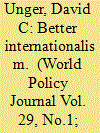

|
|
|
|
|
| Publication |
2012.
|
| Summary/Abstract |
Genoa-Internationalism has many different meanings, but constructive global citizenship should always be at its core. An internationalist foreign policy for the developed countries would use their wealth, economic might, and military power to promote a better, more peaceful, more prosperous world for everyone.
|
|
|
|
|
|
|
|
|
|
|
|
|
|
|
|
| 8 |
ID:
077214
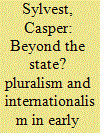

|
|
|
|
|
| Publication |
2007.
|
| Summary/Abstract |
The relationship between pluralism and internationalism is an interesting historical theme on the borderline between international relations and political theory. Intuitively the two ideologies seem to enjoy a close relationship, and at an abstract level they were both concerned with achieving political order with a minimum of central authority. However, the historical and theoretical interconnections between pluralism and (liberal) internationalism in Britain remain largely unexplored. This article attempts to fi ll this lacuna in intellectual history. Although both took shape within the confines of the same progressive intellectual agenda, the article strikes a cautious note about establishing too close a link between pluralism and internationalism, especially in the years following the Great War. This sceptical conclusion reflects not only the different preoccupations and changing nature of both pluralism and internationalism in the opening decades of the twentieth century, but also their complex theoretical relationship.
|
|
|
|
|
|
|
|
|
|
|
|
|
|
|
|
| 9 |
ID:
076798
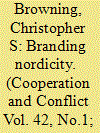

|
|
|
|
|
| Publication |
2007.
|
| Summary/Abstract |
This article introduces the idea of brands to debates about Nordic models and identity. Understanding brands to be more strategic and stable than identities, the article shows how a Nordic brand was marketed during the Cold War, but has since been challenged and undermined by a number of pressures. Central to the Nordic brand have been ideas of Nordic 'exceptionalism'-of the Nordics as being different from or better than the norm-and of the Nordic experience, norms and values as a model to be copied by others. In the post-Cold War period, key aspects of the Nordic brand have been challenged. On the one hand, elements of the Nordic elite appear to have forsaken the brand. On the other, broader recognition of a distinct Nordic brand is being undermined with the melding of Nordic with European practices and processes. The article concludes by asking whether the decline of the Nordic brand matters and further explores the link between Nordicity as a brand and as an identity
|
|
|
|
|
|
|
|
|
|
|
|
|
|
|
|
| 10 |
ID:
170677
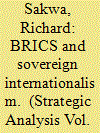

|
|
|
|
|
| Summary/Abstract |
The article outlines four types of globalism contending for hegemony today. The struggle of what effectively represents different types of international order is one reason why international politics today looks so disordered. The BRICS association is firmly located as part of one of these orders, that of sovereign internationalism, but is challenged by the disruptive implications of the Trumpian mercantilist order. BRICS and its members as a result are drawing closer to the liberal internationalist model. However, this is made more difficult by liberalism’s shift towards some of the Trumpian exclusionary agenda. Despite some inner contradictions, the BRICS is one of the institutional and normative cornerstones of sovereign internationalism.
|
|
|
|
|
|
|
|
|
|
|
|
|
|
|
|
| 11 |
ID:
054470
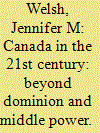

|
|
|
| 12 |
ID:
076800
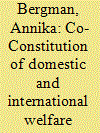

|
|
|
|
|
| Publication |
2007.
|
| Summary/Abstract |
Sweden's self-narrative is that of an outward-looking internationalist state whose commitments to justice and equality are not confined to co-nationals. What distinguishes Swedish internationalism, apart from being social democratically inspired, is that it rests on a thin conception of cosmopolitan duty that does not exclusively privilege the rights of Swedish nationals alone, but recognizes the need to extend social and political rights to non-nationals as well. Key here is the universality principle of the Nordic welfare model, which inspires policies that do not tend to discriminate on the basis of class or ethnic background. What is more, this way of thinking has not generally been confined to the domestic level, but can be traced through to Sweden's (and the other Nordic states') distinctive foreign policy traditions. This article examines the inter-connection between domestic and international welfare commitments in the Swedish context. The key thesis developed here is that states that promote the values of solidarity, inclusiveness and universal welfare at the national level are also more likely to do so beyond borders. The article deconstructs the endogenously framed ideational factors that underpin Swedish internationalism, with particular focus on social democracy in the process. It also investigates the co-constitutive relationship between Sweden's domestic and international welfare commitments by exploring contemporary discourses and practices that make up a significant part of Sweden's self-identity. Finally, it analyses the normative relevance of a social democratically inspired Swedish internationalism for the future of Nordic internationalism more generally.
|
|
|
|
|
|
|
|
|
|
|
|
|
|
|
|
| 13 |
ID:
083615
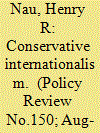

|
|
|
| 14 |
ID:
062240
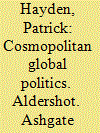

|
|
|
|
|
| Publication |
Aldershot, Ashgate Publishers, 2005.
|
| Description |
174p.
|
| Series |
Ethics and global politics
|
| Standard Number |
9780754642763
|
|
|
|
|
|
|
|
|
|
|
|
Copies: C:1/I:0,R:0,Q:0
Circulation
| Accession# | Call# | Current Location | Status | Policy | Location |
| 049689 | 172.4/HAY 049689 | Main | On Shelf | General | |
|
|
|
|
| 15 |
ID:
052224
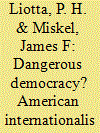

|
|
|
| 16 |
ID:
051150
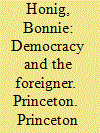

|
|
|
|
|
| Publication |
Princeton, Princeton University Press, 2001.
|
| Description |
xi, 204p.
|
| Standard Number |
069108885
|
|
|
|
|
|
|
|
|
|
|
|
Copies: C:1/I:0,R:0,Q:0
Circulation
| Accession# | Call# | Current Location | Status | Policy | Location |
| 048198 | 325.1/HON 048198 | Main | On Shelf | General | |
|
|
|
|
| 17 |
ID:
168473
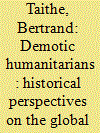

|
|
|
|
|
| Summary/Abstract |
This article focuses on over 70 years of demotic humanitarianism from a grassroots perspective. Using the archives of Hudfam and Elizabeth Wilson as well as more recent oral history of local nongovernmental organisations in the West Yorkshire region of the United Kingdom, this paper seeks to cast a new light on the complex network of humanitarianism enabled by local groups. The concept of demotic humanitarians will be used here to denote the modest scale of this work, but also the humanitarians’ self-perception as local agents of internationalism acting within localised networks. From the creation of Hudfam in 1942 (before Oxfam but in Huddersfield) to the birth of the Christian African Relief Trust or local partnerships with Ghana, this article shows how entangled in other social and political initiatives demotic humanitarians were.
|
|
|
|
|
|
|
|
|
|
|
|
|
|
|
|
| 18 |
ID:
160155
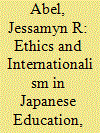

|
|
|
|
|
| Summary/Abstract |
After their government's 1933 withdrawal from the League of Nations, Japanese internationalists searched for new ways to engage with the world or struggled to accommodate their advocacy of international cooperation to the realities of the wartime empire. The idea of international morality was central to this effort. Ethics textbooks, which presented ideals of international behaviour, provide a particular view of this intellectual and policy endeavour of the 1930s and early 1940s, showing how the concept of morality became a means to reconcile internationalism with imperialism and war. Echoing many of the ideas current in both public discussion and behind-closed-doors decision-making on foreign policy at the time, textbook authors and other educators contributed to a broader redefinition of internationalism that enabled it to persist through a period of imperialism and war.
|
|
|
|
|
|
|
|
|
|
|
|
|
|
|
|
| 19 |
ID:
106836
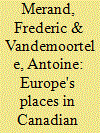

|
|
|
| 20 |
ID:
052819
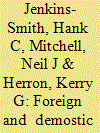

|
|
|
|
|
|
|
|